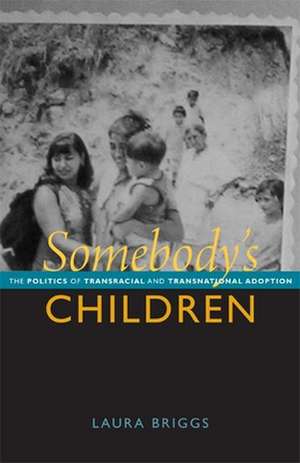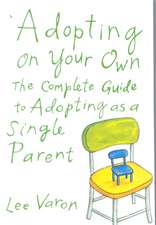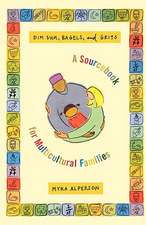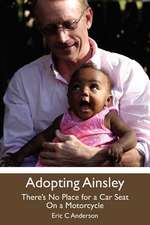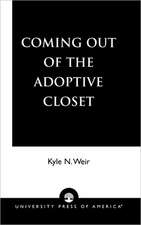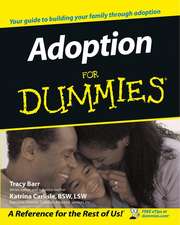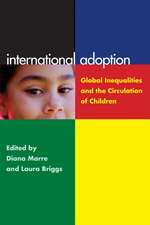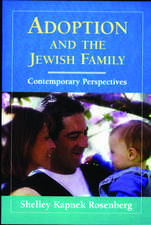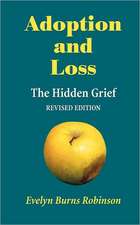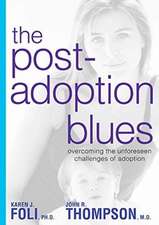Somebody's Children
Autor Laura Briggsen Limba Engleză Paperback – 6 mar 2012
Preț: 301.20 lei
Nou
Puncte Express: 452
Preț estimativ în valută:
57.64€ • 59.96$ • 47.59£
57.64€ • 59.96$ • 47.59£
Carte tipărită la comandă
Livrare economică 15-29 aprilie
Preluare comenzi: 021 569.72.76
Specificații
ISBN-13: 9780822351610
ISBN-10: 0822351617
Pagini: 360
Ilustrații: 7 photographs
Dimensiuni: 152 x 231 x 23 mm
Greutate: 0.5 kg
Editura: Duke University Press
ISBN-10: 0822351617
Pagini: 360
Ilustrații: 7 photographs
Dimensiuni: 152 x 231 x 23 mm
Greutate: 0.5 kg
Editura: Duke University Press
Recenzii
I have been longing for someone to write this book for a number of yearsand how fortunate we are that Laura Briggs has made this her project; she is an outstanding scholar and thinker. A brilliant and wide-ranging book, Somebodys Children makes a powerful contribution to the study of adoption. The public policy implications of Briggss work are stunning, and I hope this book will contribute to reshaping adoption practice in the United States. Rickie Solinger, author of Pregnancy and Power: A Short History of Reproductive Politics in America
For decades, a child saving ideology that devalues the bonds of children of colour with their families and communities has served to mask social, economic, and political inequities in the United States and abroad. Laura Briggss astute analysis exposes the historical struggles that implemented this ideology in domestic and foreign policies. Somebodys Children is essential reading for everyone concerned about the politics of adoption and the equal dignity of families worldwide. Dorothy Roberts, author of Killing the Black Body, Shattered Bonds, and Fatal Invention
Heroic rescue narratives of 'orphaned brown babiesfrom the adoption of Native children to the fairytale story of Zahara Jolie-Pittoften crumble under scrutiny. Briggs, who adopted a Mexican-American daughter, looks unflinchingly at the disturbing history of U.S. adoption across race and borders.Ms. Magazine
"Briggs shines a bright light on the politics of transracial and transnational adoption. . . . Her provocative retelling of recent adoption history emphasizes that conservative economic forces have steadily eroded state support of children in institutions or through foster care, promoting adoption as the better alternative."--Martha Nichols, Womens Review of Books
"I have been longing for someone to write this book for a number of years - and how fortunate we are that Laura Briggs has made this her project; she is an outstanding scholar and thinker. A brilliant and wide-ranging book, Somebody's Children makes a powerful contribution to the study of adoption. The public policy implications of Briggs's work are stunning, and I hope this book will contribute to reshaping adoption practice in the United States." Rickie Solinger, author of Pregnancy and Power: A Short History of Reproductive Politics in America "For decades, a child saving ideology that devalues the bonds of children of colour with their families and communities has served to mask social, economic, and political inequities in the United States and abroad. Laura Briggs's astute analysis exposes the historical struggles that implemented this ideology in domestic and foreign policies. Somebody's Children is essential reading for everyone concerned about the politics of adoption and the equal dignity of families worldwide." Dorothy Roberts, author of Killing the Black Body, Shattered Bonds, and Fatal Invention "Heroic rescue narratives of 'orphaned' brown babies - from the adoption of Native children to the fairytale story of Zahara Jolie-Pitt - often crumble under scrutiny. Briggs, who adopted a Mexican-American daughter, looks unflinchingly at the disturbing history of U.S. adoption across race and borders." - Ms. Magazine "Briggs shines a bright light on the 'politics of transracial and transnational adoption.' ... Her provocative retelling of recent adoption history emphasizes that conservative economic forces have steadily eroded state support of children in institutions or through foster care, promoting adoption as the better alternative."--Martha Nichols, Women's Review of Books
For decades, a child saving ideology that devalues the bonds of children of colour with their families and communities has served to mask social, economic, and political inequities in the United States and abroad. Laura Briggss astute analysis exposes the historical struggles that implemented this ideology in domestic and foreign policies. Somebodys Children is essential reading for everyone concerned about the politics of adoption and the equal dignity of families worldwide. Dorothy Roberts, author of Killing the Black Body, Shattered Bonds, and Fatal Invention
Heroic rescue narratives of 'orphaned brown babiesfrom the adoption of Native children to the fairytale story of Zahara Jolie-Pittoften crumble under scrutiny. Briggs, who adopted a Mexican-American daughter, looks unflinchingly at the disturbing history of U.S. adoption across race and borders.Ms. Magazine
"Briggs shines a bright light on the politics of transracial and transnational adoption. . . . Her provocative retelling of recent adoption history emphasizes that conservative economic forces have steadily eroded state support of children in institutions or through foster care, promoting adoption as the better alternative."--Martha Nichols, Womens Review of Books
"I have been longing for someone to write this book for a number of years - and how fortunate we are that Laura Briggs has made this her project; she is an outstanding scholar and thinker. A brilliant and wide-ranging book, Somebody's Children makes a powerful contribution to the study of adoption. The public policy implications of Briggs's work are stunning, and I hope this book will contribute to reshaping adoption practice in the United States." Rickie Solinger, author of Pregnancy and Power: A Short History of Reproductive Politics in America "For decades, a child saving ideology that devalues the bonds of children of colour with their families and communities has served to mask social, economic, and political inequities in the United States and abroad. Laura Briggs's astute analysis exposes the historical struggles that implemented this ideology in domestic and foreign policies. Somebody's Children is essential reading for everyone concerned about the politics of adoption and the equal dignity of families worldwide." Dorothy Roberts, author of Killing the Black Body, Shattered Bonds, and Fatal Invention "Heroic rescue narratives of 'orphaned' brown babies - from the adoption of Native children to the fairytale story of Zahara Jolie-Pitt - often crumble under scrutiny. Briggs, who adopted a Mexican-American daughter, looks unflinchingly at the disturbing history of U.S. adoption across race and borders." - Ms. Magazine "Briggs shines a bright light on the 'politics of transracial and transnational adoption.' ... Her provocative retelling of recent adoption history emphasizes that conservative economic forces have steadily eroded state support of children in institutions or through foster care, promoting adoption as the better alternative."--Martha Nichols, Women's Review of Books
Descriere
A feminist historian and an adoptive parent, Laura Briggs gives an account of transracial and transnational adoption from the point of view of the mothers and communities that lose their children. Briggs sees adoption as part of larger structures of inequality (poor people do not adopt the children of the wealthy, as she points out). In the U.S., Black, Latina, and Native American mothers are more likely to be pressed to give up their children and in Latin America violence and poverty have spurred less-than-consensual adoptions. Briggs traces the histories of the changing circumstances of such adoptions from the mid-20th century through the present.
